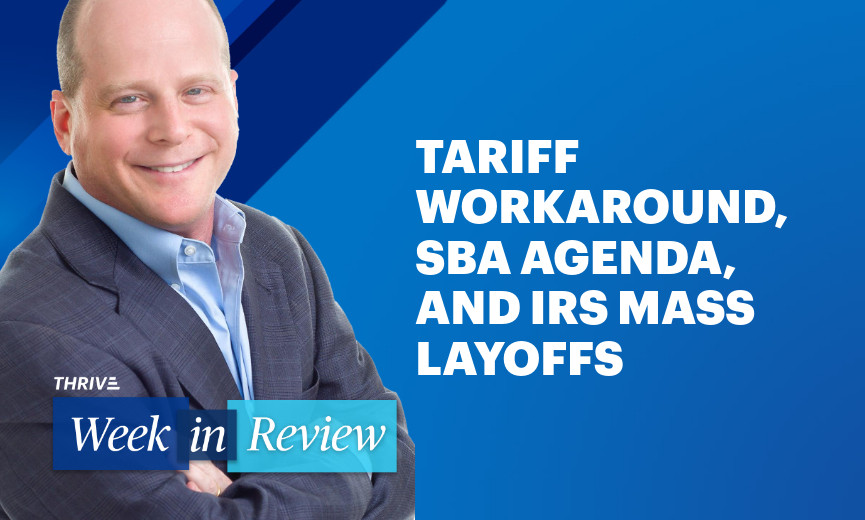California ofrece subvenciones de licencia familiar remunerada, aumenta la venta de pequeñas empresas y Nueva York quiere prohibir los bots de reserva de restaurantes

Podcast •

Vea
Resumen
Los propietarios de empresas de California podrían obtener cierto alivio (hasta USD 2000 por empleado) en virtud de un nuevo programa que ofrece subvenciones para ayudar a compensar parte del costo de cubrir la licencia familiar remunerada. Gene Marks proporciona más información, además de destacar el aumento interanual del 10 % en la venta de pequeñas empresas, y señala que la próxima generación es la que interviene. Además, Nueva York aprobó un proyecto de ley para prohibir los bots de reserva de restaurantes que la gente utiliza para engañar al sistema.
Ver transcripción
[Gene Marks, host]
Hey, everybody, it’s Gene Marks and welcome back to another episode of the Paychex THRIVE Week in Review podcast. This is the podcast where we take a few items from the news each week and talk a little bit about them because they impact both your small business and my small business.
Listen, before we get started, don't forget that on July 1 the Department of Labor's new Overtime Rule is going to start taking effect, which could mean that you have to pay more in overtime wages to certain employees in your company. You should be finding out more about it. Paychex has a great overtime rule resource page. It’s at go.paychex.com/ot-rule. Go there and get all these different resources, including webinars and other written documentation, to help you navigate your way around this new overtime rule, which is going into effect, again on July 1.
Also, if you need any help or tips in running your business or any advice or you want to get past episodes of this show, please sign up for the Paychex Drive newsletter. Go to paychex.com/thrive and you will be in the know. Okay, let's go to the news from this week, shall we?
The first item of news I want to talk about comes from California. This week, new online applications are being taken for a special grant to help California businesses pay for paid family leave. This comes from the website CaliforniaPFL.com. That's the PFL program for paid family leave. Small businesses in California with one to 100 employees with at least one employee utilizing the paid family leave program on or after June 1 of 2024 are eligible to apply for grants for up to $2,000 per employee for this paid family leave to offset the increased costs associated with employees out on leave.
Paid family grant amounts differ by the size of the company. If you've got over 51 employees – between 51 and 100 employees – the grant is $1,000 per employee. If you have less than 50 employees, it's $2,000 per employee.
So, I know a lot of you guys are in California that are watching or listening to this podcast. Just know that if you have an employee that goes on paid family leave and you are paying for them to be out to look after dependents, the state of California is trying to help you out a little bit by giving you a grant. Again, it’s $2,000 if you have less than 50 employees and $1,000 if you have between 50 and 100 employees. That's the first item of news.
The second item of news comes from BizBuySell.com. BizBuySell is a platform that helps both buyers and sellers of businesses buy and sell their business. They provide resources for doing that. Every month they come out with their insights report and this one showed some really interesting activity, and let me read it for you.
“Small business acquisitions – this is like the number of business owners that are selling their businesses – grew 10% over the previous year and 3% over the previous quarter,” according to the BizBuySell Insight data report. By the way, it's a quarterly report, not a monthly report. I do apologize.
There's a total of 2,384 businesses that changed hands, according to their records in the first quarter of this year, representing an enterprise value of $1.8 billion – that's 24% higher than this time last year.
Some more insights: After a relatively flat 2023 bogged down by rate hikes and the economy teetering between recession and a soft landing, deals appear to be moving forward again. In fact, U.S. banks anticipate an increase in demand for loans in 2024, according to a recent Federal Reserve survey. That said, with inflation still above the Federal Reserve's 2% target, comments by Fed Chair Jerome Powell indicate rate cuts are not likely to happen any time soon. However, for now, borrowers appear to be adopt adapting to the higher rate environment and they are selling more businesses.
Very, very interesting to hear. I think that we are going to be seeing over the next few years, at least the next 5 to 8 years, a boom in businesses being sold. Why? Because we have an aging demographic of baby boomers that are looking to exit out of their businesses, and we've got a growing demographic of Millennials who have put some time into the companies they work for and are looking to be entrepreneurs themselves.
And what better way to be an entrepreneur than to buy an existing business rather than start something from scratch? I think we're seeing this already. So, according to BizBuySell, business sales and acquisitions are up 10% over last year, and values of the businesses being sold up 24%.
The last and final story comes from New York’s eater.com and NY.eater.com. Let me read this to you: Trying to get at a restaurant on a Friday night for three people in New York City is certainly not easy right? There are reservation platforms like Resy and OpenTable and Tock and SevenRooms. These are all popular reservation platforms that people are aware of. However, they get filled up and people have come up with a way of gaming the system.
Many reservations in these forms are obtained through bots that are made to wait until certain times for a restaurant to open its books for the month, and then it's not even a, you know, an equal playing field. So, there's all these bots that are out there that people are joining up with so that they can get their reservations that much quicker, sort of gaming the system.
Well, guess what? The New York Legislature is going to do something about that. A bill passed in New York this week would make hawking reservations in online forms obtained by bots illegal. The Restaurant Reservation Anti-Piracy Act is waiting for the signature of New York's Governor Kathy Hochul. Should she sign it? New York will be the first state in the country to combat the trend of predatory software flooding the online reservation marketplace. New York is uniquely qualified to be the first, of course, but it's a city with arguably the most competitive reservation wars in the country.
So, the bottom line is this If you are a diner or a consumer and you're looking to use some of these bots that you can find in online forms all over the place to game the system and grab your reservation because they're making their reservations in offline hours, guess what? It’s going to be illegal. These bots are going to be put out of business, which means you're going to have to enter the fray with the rest of us.
Now, as for business owners, that helps with your online reservation system and I think makes a more of a fair distribution of reservations to your customers, as well. You want everybody having a fair chance to eat at your restaurant, right? Well, now the New York Legislature is going to allow people to get a fair chance to eat at your restaurant.
That's the news. My name is Gene Marks. You have been listening and watching to the Paychex Week in Review podcast.
Remember, the overtime rule goes in effect from the Department of Labor on July 1. Paychex has lots of great resources for this overtime rule. Let me make sure that I am giving you the correct website. It is go.paychex.com/ot-rule. Go and view a webinar. Go and also look at other documentation to help you adjust and adapt to this new overtime rule.
And again, if you are looking for advice and help and tips in running your business, please get our Paychex THRIVE newsletter. Go to paychex.com/thrive. Thanks so much for joining. We'll see you again next week. Take care.
This podcast is property of Paychex, Incorporated, 2024. All rights reserved.

 Apple Podcast
Apple Podcast Spotify
Spotify iHeartRadio
iHeartRadio







